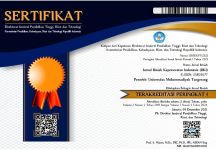The Relationship between Perceived Social Support and Quality of Life of Older Adults with Hypertension in Tangerang
Abstract
The aging population is a common situation in developing countries caused by the successful health care outcome. However, the increasing prevalence of chronic diseases, such as hypertension is the impact of physical deterioration caused by the aging process. Older adults with hypertension require social support as a source of external support to help maintain health, which could affect the quality of life. A cross-sectional study was used by recruiting 71 older adults in primary health care in Tangerang. The standardized questionnaires, including the Multidimensional Scale of Perceived Social Support (MSPSS) and World Health Organization Quality of Life (WHOQOL) -BREF were provided based upon validity and reliability. Statistical analysis was conducted by employing the Pearson Product-Moment coefficient correlation. The result showed that perceived social support was significantly positively correlated with the quality of life of older adults with hypertension. In conclusion, this study suggests that maintaining social support from family, friends, and significant other needs to be considered in achieving a better quality of life for older adults with hypertension.
Keywords: Older Adult, Hypertension, Social Support, Quality of Life.
Full Text:
Karina_JIKIReferences
Baernholdt, M., Hinton, I., Yan, G., Rose, K., & Mattos, M. (2012). Factors
associated with quality of life in older adults in United States. Quality of Life
Research. Vol. 21 (3): 527-534.
Hongthong, D., Somronthong, R., & Ward, P. (2015). Factors influencing the
quality of life (qol) among Thai older people in rural area of Thailand. Iraian
Journal of Public Health. Vol.44 (4):479-485.
Ibrahim, N., Din, N. C., Ahmad, M., Ghazali, S. E., Said, Z., & Shahar, S. (2013).
Relationship between social support and depression, and quality of life of the
elderly in rural community in Malaysia. Asia-Pacific Psychiatry. Vol.5
(2013): 59-66.
Kang, H-W., Park, M., & Wallace, J.P. (2016). The impact of perceived social
support, loneliness, and physical activity on quality of life in South Korean
older adults. Journal of Sport and Health Science. Vol.xx(2016): 1-8.
Kementrian Kesehatan RI. (2013). Riset Kesehatan Dasar Riskesdas 2013.
Available source:
http://depkes.go.id/downloads/riskesdas2013/Hasil%20Riskesdas%202013.pdf
February 16, 2016.
Kusumawardani, A. (2014). Hubungan antara Dukungan Sosial dan Kualitas
Hidup pada Lansia Penderita Hipertensi. Diploma thesis, Universitas
Padjadjaran
Ma, L., Li, Y., Wang, J., Zhu, H., Yang. W., & Cao, R., et al. (2015). Quality of
life is related to social support in elderly osteoporosis patients in a Chinese
population. PLoS ONE. 10(6): e0127849. doi:10.1371/journal.pone.0127849.
Mardiati, R., Joewana, S., Kurniadi, H., Isfandari., & Sarasvita R. (2004).
Terjemahan the World Health Oragnization quality of life (whoqol) – BREF.
Available source:
http://www.who.int/substance_abuse/research_tools/en/indonesian_whoqol.pdf
Rohmah, A. I. N., Purwaningsih., Bariyah, K. (2012). Kualitas hidup lanjut usia.
Jurnal Keperawatan. Vol.3 (2): 120-132.
United Nation. (2015). World population prospects. Available source:
https://esa.un.org/unpd/wpp/publications/files/key_findings_wpp_2015.pdf ,
February 2016.
Unsar, S., Erol, O., Sut, N. (2016). Social support and quality of life among older
adults. International Journal of Caring Science. Vol.9 (1): 249-257.
Wedgeworth, M., LaRocca, M. A., Chaplin, W. F., Scogin, F. (2017). The role of
interpersonal sensitivity, social support, and quality of life in rural older
adults. Geriatric Nursing. Vol.38 (2017): 22-26.
Winahyu, K. M., Hemchayat, M., Charoensuk, S. (2015). Factors affecting quality
of life among family caregivers of patients with schizophrenia in Indonesia.
Journal of Health Research. Vol.29(suppl.1): S77-82.
DOI:10.14456/jhr.2015.52.
World Health Organization (WHO). (1997). Programme on mental health:
WHOQOL measuring quality of life. Available source:
http://www.who.int/mental_health/media/68.pdf, Februari, 2016.
Wrosch, C. (2015). Developmental task- adulthood and old age. Available source:
http://medicine.jrank.org/pages/457/Developmental-Tasks-Adulthood-old-
age.html, February 2016.
Zimet, G.D., Dahlem, N.W., Zimet, S.G., Farley, G.K. (1988). The
multidimensional scale of perceived social support. J Pers Assess. Vol. 52(1):
-41. doi: 10.1207/s15327752jpa5201_2.
DOI: http://dx.doi.org/10.31000/jiki.v1i1.133
Article Metrics
Abstract - 3514 Karina_JIKI - 5159DOI (Karina_JIKI): http://dx.doi.org/10.31000/jiki.v1i1.133.g192
Refbacks
- There are currently no refbacks.
Copyright (c) 2017 Jurnal Ilmu Keperawatan Indonesia (JIKI)
JIKI: Jurnal Ilmiah Keperawatan Indonesia a Creative Commons Attribution-ShareAlike 4.0 International License. © View My Stats







